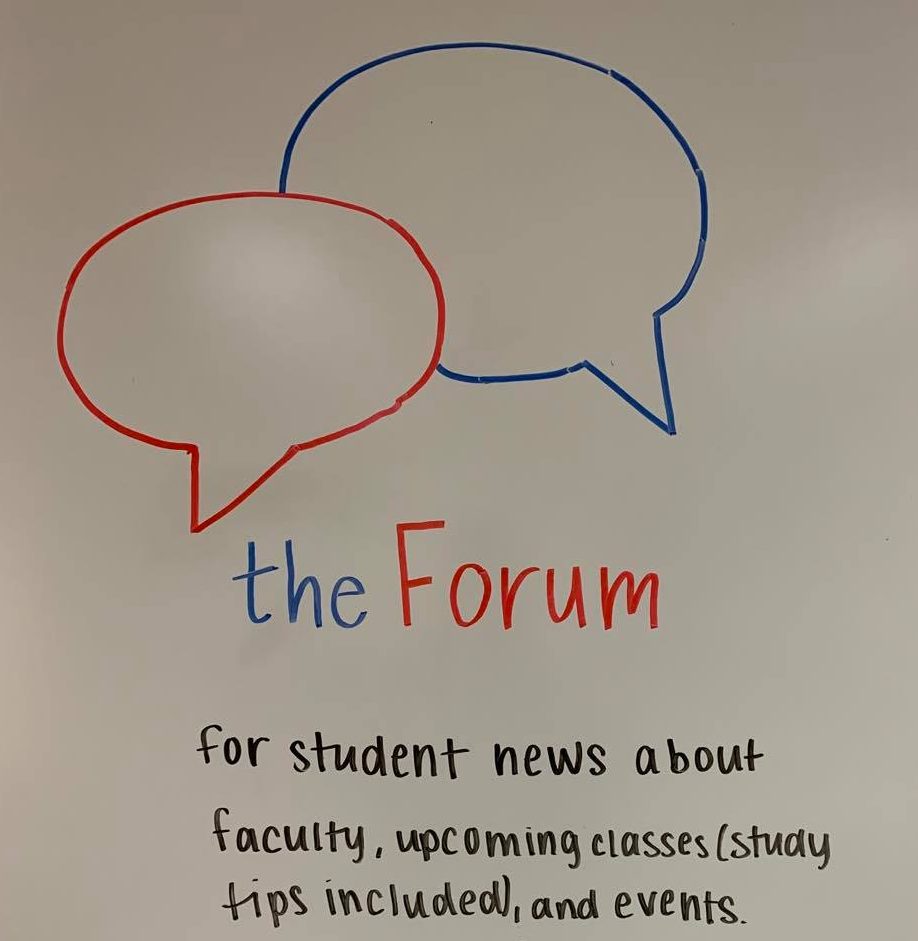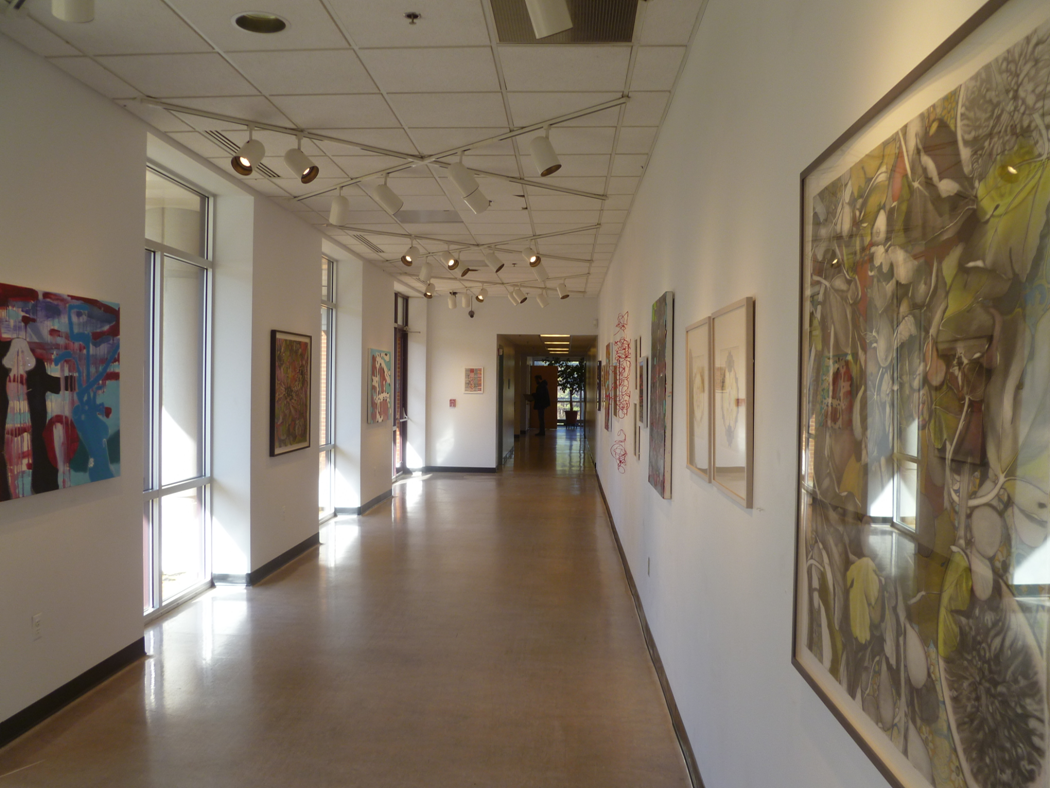
A Newsworthy Class: Intro to Journalism
Looking for a class that teaches everything from newsworthiness to redundancy to clichés and no-no words? Articles are the cornerstone of modern journalism, which is why PVCC offers a journalism course both in the fall and spring semester. Taught by Professor of English Dr. Tamara Whyte, Introduction to Journalism (ENG 121), teaches even the most challenged writer how to formulate well-crafted articles.
“Especially in school, it’s always encouraged to write longer rather than shorter, but in journalism (and much of the real world) it’s better to get your point across in as few words as possible. This makes it so the writing is more direct, eliminating the unnecessary fluff that students stuff into essays to try and reach that length requirement, and it allows the writer to highlight what’s really important,” said Jude Bolick, former ENG 121 student, assistant editor for The Forum, and current intern for Dr. Whyte.
When asked about her experience as a journalism professor, Dr. Whyte responded, “This is my seventh year teaching journalism at PVCC. My first major was journalism, and I enjoy taking what I have learned in many classes and experiences and using it to create a practical journalism class for PVCC students.”
Journalism is considered a transfer elective for most majors at PVCC, for any students looking to enhance their writing skills for an English major or just to tweak their knowledge.
“At the time, my favorite aspect was just learning about journalism and the media in general, and I still do love learning more about the world of journalism,” said Ginger Hood, former ENG 121 student, assistant editor for The Forum and current intern for Dr. Whyte.
Prior to the COVID-19 pandemic, Journalism was found in the main building, room M617D (inside the Writing Center). During this unprecedented time of transitioning from in-person to online classes, Dr. Whyte did her best to provide a fun loving learning environment via Zoom.
“It was a really positive experience, and though I still love taking journalism online, I do miss in-person class and Forum meetings. Going online has definitely made some parts of the class more efficient, but I miss sitting next to the friends I made in Journalism 1 and doing projects together, or even just getting to talk to people more before and after class,” said Hood.
In the upcoming semester, Journalism will be offered again via Zoom Tuesdays and Thursdays from 11 a.m to 12:15 p.m. The prerequisite for this course is the completion of English 111 (College Composition I).
While most classes have pricey textbooks that will likely never be used again once the class is over, Journalism has a different approach to having literature that can be used for all forms of writing. The two required textbooks are The Associated Press Stylebook and Briefing on Media Law ($17) and Journalistic Writing: Building the Skills, Honing the Craft ($20).
“Any student who wants to improve their writing or build their resume could get a lot out of the class,” said Dr. Whyte.
Journalism may be an intimidating choice for some students, but it is a gateway to learning all forms of writing.
“I was actually dreading the class at first, because I’m rather introverted by nature and not a big reader of the news. Looking back on it now, I’m so glad that I took it, because it helped me find my calling in life, and I’ve met so many wonderful people. It’s an experience I will never forget,” said Bolick.
Dr. Whyte added to this point by saying, “I think it is a special class because we get to have a workshop environment and students get to produce the school newspaper, which gives them great skills and experience. Students get to develop as writers and editors, skills that transfer to other types of writing as well.”
It can be argued that journalistic writing is an acquired skill, but any student who puts their mind to it can excel in this course.
“I learned a whole new style of writing, AP style was so different from what I was used to that it definitely took me time to adjust. However, my writing in general has become a lot more clear and concise, and I’ve gotten much better at writing from a more removed perspective,” said Hood.
“Journalism also gives students a reason to get more involved at the college and in the community as they conduct interviews and write articles,” said Whyte.
This class is truly a resource to a better future in writing for every student no matter what background or major.
“Focusing on making my writing as clear and simple as possible has made a positive impact in both my writing and the way I speak; whether in a speech, conversation, or argument, my ability to present ideas and concepts has definitely improved because of my experiences with journalism,” said Hood.
Although there are set lesson plans, the class is always evolving to meet the changes in media, language as a whole, and the students in the class.
“It grows and changes to meet the needs of my students as well. For example, a few years ago, I added the day on fake news, as that has become a bigger problem in recent years, and we could not simply ignore it in our class,” said Dr. Whyte.
Not only does Journalism help with the written skills of students, it also helps with communication.
“As a journalism student, I was really nervous and was horrified at the thought of having to interview people to get quotes,” said Bolick “After getting through that first interview, however, I felt much more confident and by the time I became an assistant editor, I was tackling article topics that just a few months ago would have terrified me.”
Once a student has completed the Introduction to Journalism course, they can move on to Journalism 2 or to become an intern for Dr. Whyte.
“When I did my presentation for your class on headlines and tweets, it was really interesting to be on the other side of things. Just last spring I was in your class, and now I’ve given a lesson for one, so it was pretty cool to see how far I’ve come,” said Bolick.
The additional perks that are available past ENG 121 are rewarding in their own way and show the development of the students involved.
“I really enjoy all of the extra opportunities I get as an intern, like helping teach the Journalism 1 students or having more flexibility in how work gets distributed behind the scenes of The Forum. Both have been really positive experiences for me, and I have really liked getting to work with and get to know Dr. Whyte,” said Hood.
For students who are interested in taking the ENG 121 course that have questions for Dr. Whyte, could best contact her via email (twhyte@pvcc.edu). Dr. Whyte typically responds within 24 hours during the week and 48 hours during the weekend.






